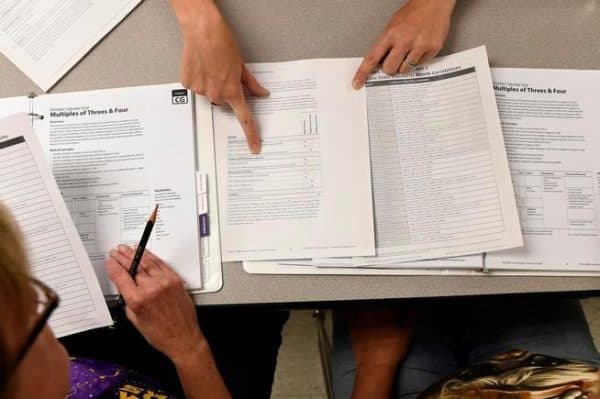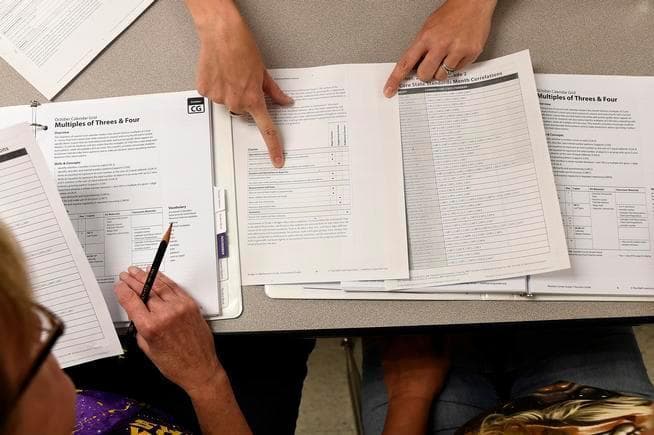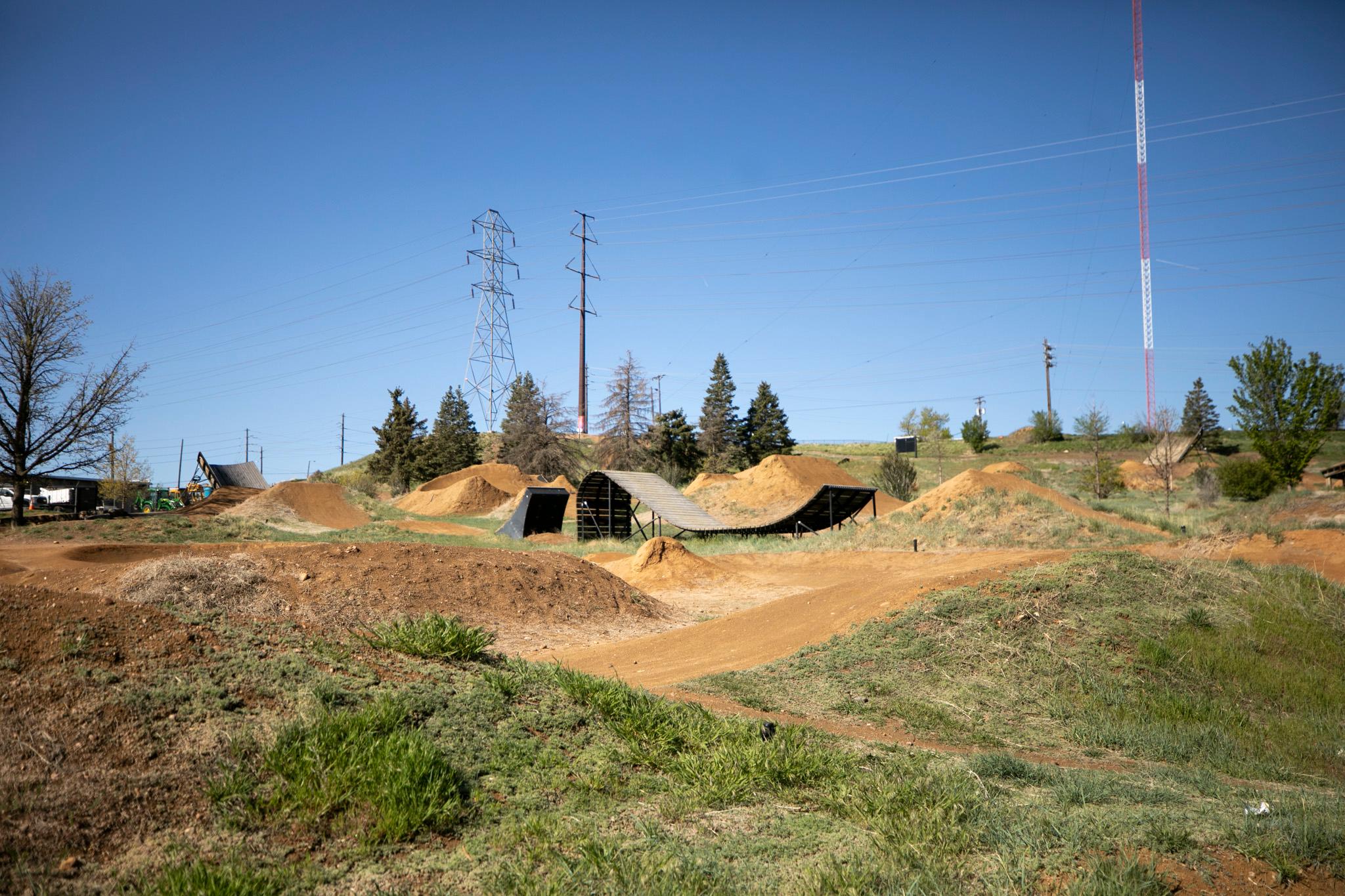
Compared with other large Colorado school districts, Denver Public Schools has a higher proportion of teachers set to lose tenure under a sweeping educator effectiveness law passed six years ago.
Forty-seven Denver teachers are poised to lose non-probationary status — or tenure — after two consecutive years of being rated ineffective at their jobs, according to district officials. Those teachers represent about 2 percent of the total number of non-probationary teachers in DPS, the state’s largest school district.
A survey by Chalkbeat also found: In Aurora, 12 non-probationary teachers are set to lose their status, which is less than 1 percent of the district’s total number of tenured teachers. In the Cherry Creek School District, only one teacher is facing the same fate. And in Jefferson County, the state’s second largest district, no teachers will lose non-probationary status due to poor ratings.
Chalkbeat also requested numbers from Douglas County but the district did not provide them.
Colorado’s educator effectiveness law, still widely referred to as Senate Bill 191, requires several things:
That all teachers be evaluated every year. In the past, only non-tenured teachers were evaluated every year. Tenured teachers had to be evaluated every three years.
- That at least 50 percent of a teacher’s evaluation be based on student academic growth, which was not the case before Senate Bill 191.
- That probationary teachers — who are most often brand-new teachers — must have three consecutive years of effective ratings to gain non-probationary status. Before the law, teachers earned non-probationary status after three years of employment.
- That non-probationary teachers who receive two consecutive years of ineffective ratings return to probationary status, a consequence that didn’t exist before Senate Bill 191. Those teachers don’t automatically lose their jobs, only their tenure.
Because of the timeline for the rollout of the law, that consequence is just going into effect now based on teacher ratings from the 2014-15 and 2015-16 school years.
Job security is the biggest difference between probationary and non-probationary status. Probationary teachers are hired on one-year contracts. A district can get rid of a probationary teacher at the end of that contract for any reason allowed by law.
Non-probationary teachers can only be fired if a district can prove one of several grounds, such as that a teacher was insubordinate or immoral. Those teachers can appeal a dismissal all the way up to the state Supreme Court, which can take many months.
Non-probationary teachers can also appeal a rating of ineffectiveness. Appeals processes are ongoing in several districts and could affect the final numbers of teachers who lose non-probationary status.
Because this is the first year teachers can lose that status, district officials said it’s difficult to know why the numbers differ from district to district.
Sarah Almy, the executive director of talent management for DPS, said Denver’s higher proportion of teachers set to lose tenure doesn’t mean its staff isn’t up to snuff.
“I don’t think this reflects that Denver has fewer effective teachers or that our teachers and what they’re doing to advance student learning is any less powerful or effective,” she said.
While many districts use a state-developed model teacher evaluation system created in response to Senate Bill 191, Denver uses a system of its own design.
Almy said the goal of the system — called Leading Effective Academic Practice, or LEAP — is not to be punitive but to help teachers improve.
“And a really important part of that is giving honest feedback to teachers, in both what they’re doing really well and what they need to grow and develop in,” she said.
Colorado’s law is part of a bigger national trend spurred in part by the federal Race to the Top program, which offered millions of dollars in grants to states that put in place certain policies, including more stringent teacher evaluations. Most states now require student academic growth to be part of those evaluations, according to the National Council on Teacher Quality.
By the council’s count, tenured teachers in five other states — including Indiana and Tennessee — lose their status if they’re rated ineffective. In Michigan, teachers who are rated that way for three consecutive years are dismissed, according to the council.
But council president Kate Walsh said many states still aren’t taking teacher evaluations seriously. Previous evaluation systems were criticized for being binary and lax, she said: Teachers were rated satisfactory or unsatisfactory, and very few ended up in the latter category. Taking student test scores into account was meant to inject objectivity and rigor into the process.
However, Walsh said, “many of the first rollouts of these new evaluation systems have not been impressive in terms of distinguishing between teacher talent. Everyone is still getting great marks.” She added, “If I were a superintendent and I didn’t see a fairly good distribution curve within my district, I’d be suspicious about what was going on.”
In Denver, teachers can earn one of four ratings: distinguished, effective, approaching and not meeting. In 2015-16, 29 percent of non-probationary teachers earned distinguished, 65 percent earned effective, 6 percent earned approaching and 0.1 percent earned not meeting.
Teachers in the bottom two categories were eligible to lose tenure if it was the second year in a row they’d been rated either approaching or not meeting.
DPS did not provide a list of the schools at which the 47 teachers set to lose tenure taught. But the district did provide some information about the teachers and their students:
- Twenty-eight of the 47 teachers set to lose tenure — or 60 percent — have more than 15 years of experience. Ten of those teachers — 21 percent — have 20 years or more of experience.
Overall, about 33 percent of non-probationary DPS teachers have more than 15 years experience, and about 14 percent have more than twenty years of experience.
- The majority of the 47 teachers — 26 of them — are white. Another 14 are Latino, four are African-American, two are multi-racial and one is Asian.
About three-quarters of all DPS teachers — probationary and non-probationary — are white.
- Thirty-one of the 47 teachers set to lose tenure — or 66 percent — teach in “green” or “blue” schools, the two highest ratings on Denver’s color-coded School Performance Framework. Only three — or 6 percent — teach in “red” schools, the lowest rating.
About 60 percent of all DPS schools are “green” or “blue,” while 14 percent are “red.”
- Thirty-eight of the 47 teachers — or 81 percent — teach at schools where more than half of the students qualify for federally subsidized lunches, an indicator of poverty.
That’s the case at about 79 percent of all DPS schools.
Pam Shamburg, executive director of the Denver Classroom Teachers Association, said the union has long been concerned about this provision of Senate Bill 191 because teachers who are demoted to probationary status lose their due process rights.
She’s also worried it will lead to higher teacher turnover. Ten of the 47 DPS teachers set to lose non-probationary status have submitted notices of resignation or retirement, officials said, though nine of them did so before learning they would lose tenure.
“This happening to 47 teachers has a much bigger impact,” Shamburg said. “There will be hundreds of teachers who know about this. They’ll say if they can do that to (that teacher), they can do that to me.”
Chalkbeat is a nonprofit news site covering educational change in public schools.













